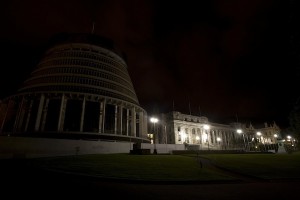 EVERY TIME A DEMOCRATIC COUNTRY has voted to unseat an established incumbent it has done it embracing a sense of vision.
EVERY TIME A DEMOCRATIC COUNTRY has voted to unseat an established incumbent it has done it embracing a sense of vision.
In the United States, John F Kennedy did it with his ‘a torch has been passed to a new generation of Americans…” Bill Clinton did it with his “It’s about the economy stupid” and selecting his campaign song, Fleetwood Mac’s “Don’t Stop Thinking about Tomorrow”. And Obama did it with his pitch to the disengaged and alienated voters with his “Yes We Can!” campaign slogan.
Here in New Zealand Micky Savage did it with his ‘One man one job’ tactic of getting people back into work so as to lift New Zealand out of the great depression.
After nine years of near totalitarian rule under Robert Muldoon, David Lange did it with a commitment to consensus and a pitch that every New Zealander, including Muldoon, had a roll to play in rebuilding a new New Zealand.
Helen Clark did it after the disintegration of the National-New Zealand First coalition under Jenny Shipley with her leadership and integrity pitch presenting the country with a commitment card, then systematically moving to address each point.
On every occasion a vision was presented. It did not always end as promised or anticipated, but in the beginning, on every occasion, a significant leader was able to engender a feeling of hope among the people and mobilise voters on election day.
Rarely, has New Zealand had the opportunity to elect a true States-person, a person such as David Lange, who had the oratory skills and gravitas to leverage New Zealand’s independent ethos to a status of significance on the world stage.
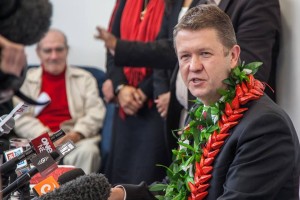
At his launch there was a realisation that many hurdles must be overcome. So, as with all great adventures it begins with a thought. The questions are: can David Cunliffe lead Labour and the opposition parties to victory in 2014? Will the Labour caucus, membership, and affiliate unions embrace this man should he become this nation’s leader?
From his electorate office in working class New Lynn, a realisation was driven home to all who witnessed it that the Labour Party was being presented with a new beginning, a new chance. Cunliffe’s launch had all the hallmarks of a movement not just a campaign. And that’s why Cunliffe’s launch is the circuit-breaker Labour has been seeking since Helen Clark stood down from the leadership.
David Cunliffe’s launch demonstrated the symbolism of inclusion. Like Lange, Cunliffe referenced how he needed everyone in his party to get stuck in and get New Zealand back on track. But unlike Lange, Cunliffe understands economics, finance, and the vulnerabilities political leaders suffer when trusting others to advance an economic revolution in their name.
Cunliffe has been quick to own the message that Labour is fortunate to have such depth of talent as is underscored by the calibre of his competitors Grant Robertson and Shane Jones. He has demonstrated that unity, not factionalism, will be hallmark of his leadership – where everyone will have a role toward realigning our New Zealand to the true Kiwi way. And at his launch, he indicated how proud he would be to have Grant Robertson on his winning front-bench team.
The team effort was the message that was rammed home with a sincerity that caused the man’s voice to quiver. The emotion was not forced nor contrived. Cunliffe didn’t have a peeled onion in his pocket, ready to squeeze at the pre-planned moment. The emotion was real. That passion demonstrated a strength that did not emit simply from the man’s mind, but rather, it was holistic – it came from mind, heart, and soul. It portrayed strength.
David Cunliffe was surrounded by people from all walks of life. Tangatawhenua, Iwi and urban Maori, New Zealand born Kiwis and our Pacifika communities, and people who have arrived more recently. Blue collar and white collar workers, people who have fallen out of favour with the current National-led Government – the well, but out of work, and the unwell. Those who strive for gender equality were there, alongside those whose politics is defined by identity.
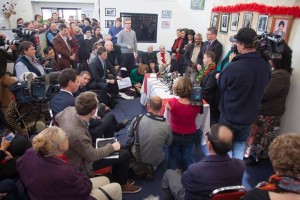
Cunliffe emits a sense that he knows his party and us. It is not a sympathy, nor an intellectual abstract concept. He connects to the point where all that becomes an empathy. But the difference between you and I is he has the ability to lead, when given the opportunity.
His style of leadership is more representative and solution-based than others who stand upon that elevation-of-office and look back down at us.
The connection at this week’s launch demonstrates an understanding that among us all lingers a potential that is today being arrested, for a multitude of reasons, and, in some cases, that potential has been exhausted. On Monday, David Cunliffe committed to doing something about that, to restoring opportunity for our children, to deliver a country to the next generation that is better, not worse, than what came before.
He indicated he would do away with a culture that embraces the more sinister elements of political expression that have become manifest within today’s New Zealand – where those who are finding it tough are pushed away, given labels, marginalized, and defined as parasites. Cunliffe committed to fairness, to changing that government-backed culture.
It is a vision that indicates a new beginning, as his campaign keywords indicate. This is the beginning of his party’s commitment to you.
We know this man disagrees with the National-led Government’s advance to embedding this spy culture in New Zealand – that dark cloud of sinister intent that has swept the world. Who would have thought twelve months ago just how darkly connected New Zealand had become to the wants of external superpowers. What has become of our independence? Can New Zealand again become that independent voice on the world stage that connects to billions on humanitarian, economically and environmentally sustaining principles?
One gets a sense that David Cunliffe is committed to reversing that subservience to the darker forces that lie within the US and other external powers – a reconnection of sorts that knits together New Zealanders with this nation’s proud heritage of independence where our standing on the world stage is not regarded by how many people we could collectively kill, but by the strength of the morality of our ethos, way of life, and argument.
And importantly, domestically, it is about the economy and anyone who says otherwise is stupid – as Bill Clinton once said. A well governed economy will provide opportunity, prosperity, and stability and will prepare us all to meet the challenges that lie ahead.
Cunliffe has shown that when tag-teaming up with the best the opposition parties have to offer, great opportunities developed – for example, on identifying the problems within New Zealand’s manufacturing and export sectors. David Cunliffe, David Parker, Russel Norman, and Winston Peters joined forces with business and union counterparts to develop a cause-effect-solution methodology that would re-align our productive sectors to their offshore markets, develop once again regional economies and opportunities in the provinces, get people back into work rather than joining the increasing numbers of layoffs – which is in evidence under this current National-led Government.
Intervention was the style where a view emerged that a Government does not command all but it must assist all sectors to ensure domestic economy imbalances are identified and addressed – rather than be swept under the carpet. It is about making sure every business, every worker has a shot at making the lot of our country better.
There is now no room for a government that ignores, or does not want to fix, the problems that exist today.
David Cunliffe, Grant Robertson, and Shane Jones have yet to reveal their policy plans. But let it be said, these leaders all know their stuff. All can work toward creating a better New Zealand, and all of those relying on Labour to do its bit to create a Cabinet in Waiting movement will be happy with whoever gets to lead.
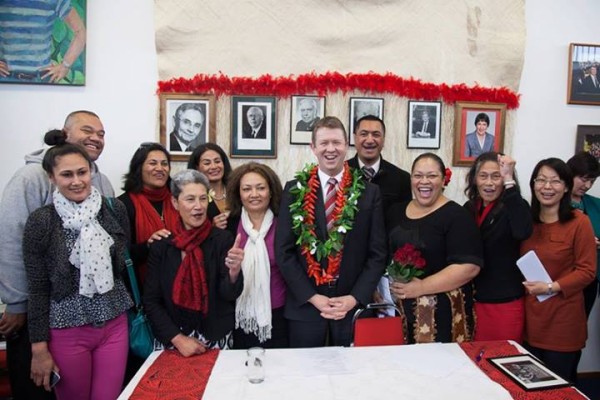
But only one can truly unite Labour and reconnect it to the provinces, the cities, and the people. And only one has demonstrated the leadership necessary to roll out a solution-based plan that will not only beat National in 2014 but create a watershed moment where New Zealand draws a line in the sand and truly gets on with the job.
But first, there is one hurdle to cross. Labour, the country is in your hands.

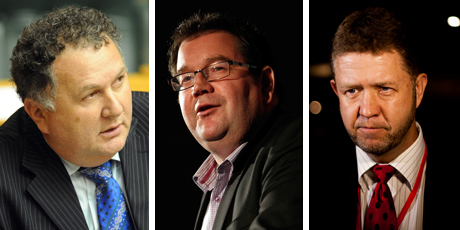




“Will the Labour caucus, membership, and affiliate unions embrace this man should he become this nation’s leader?” Selwyn Manning.
With 20% of the vote and the caucus and membership split, the affiliated unions look likely to be the king maker in the selection of the New Labour Party leader.
The current government is planning to pass a law that will make it possible for employers to unilaterally declare an end to bargaining.
The point about the employer being able to unilaterally conclude bargaining. Is that from then on all strikes are illegal.
For those workers or unions that dare persist continuing taking industrial action past that point, any form of industrial action, whether it be against low wages or unfair imposition by their employer, will face potentially harsh criminal penalties including arrest and court imposed fines on workers and their organisations, up to and including jail time and confiscation of their property including their homes and for an organisation their bank accounts.
The proposed Employment Relations Act Amendment Bill. Continues the work of National’s ECA carried on under Labour’s ERA to make all strikes illegal outside of a narrow window around bargaining for a new collective collective agreement.
Now bargaining and the industrial action around bargaining is being outlawed at the employers discretion. This makes New Zealand one of the few countries in the world and probably the only democratic one, outside of oppressive dictatorships and police states to make all strikes virtually illegal. (Except that is ones the employer allows). This continues this government’s policy of taking more and more oppressive police state power into the hands of the state on behalf of National’s rich mates.
The point is, what is the Labour Party and the Greens going to do about it?
Will they like Helen Clark leave most of these strictures on the right to strike in place?
In light of the current leadership debate going on in the Labour Party, and the important role that unions will play in it. Will Helen Kelly be demanding that the candidates come out and vow openly that they will move immediately repeal this piece of legislation on gaining the necessary seats to govern?
And it will be this candidate the unions will back?
The funny thing about the unions have a direct say in who is the next leader of the Labour Party is that some/many of their members are not actually Labour Party supporters. Some may even be National supporters. I understand some unions are having their delegates decide while some are going to let members vote. So there will be a lot of non-Labour Party members voting for leader of the Labour Party. No other political party in New Zealand allows this (as far as I am aware).
The only union which is allowing their members to have a proportional vote is the Service and Food Workers Union, and from my understanding, anyone who is a member of another political party will be excluded from the vote. For the other unions, the delegate which votes on behalf of the union must be someone who is not a member of another political party. While I’m sure there are some members of the SFWU who are not labour supporters, because of the types of people they represent, there would be very few (if any) supporters of National. The total proportion of the SFWU vote on the leadership is only 5%, so even if there were a few people there who had malicious intent (highly unlikely), they would be highly unlikely to have much impact.
Overall, I’m not sure I agree that the union influence will be a bad thing. After all, Labour was founded by the unions to support workers. Going back to their core principles can only be a good thing.
To ALL who may get over excited:
While I welcome the departure of Shearer, the standing for the post by Cunliffe, Robertson and one other, I must just humbly ask all of you, who read this, to get another grip of bloody reality, to not get carried away, and to REFLECT, please.
We had a turmoil of a week or two, and it was great that Key and consorts are now getting scared, same as Farrar, Hooton, Whalesoil and whosoever supports the status quo.
But do not cheer too much and too early. Perhaps think about what we may face.
Robertson has all the time been behind the Shearer agenda, either he supported him, held him up for good or otherwise ulterior motives, to finally fail, so he cound step up and take charge. Robertson is a middle or centre man, perhaps for some in Labour too much to the right. He is definitely a status quo man, and he stands pretty much for what we got from Shearer so far, as in some ways he “guided” and assisted Shearer to deliver what he did. Maybe Shearer was his “experiment” to see how it worked?
In any case, that is about where Robertson comes from, and he is happy for election “bribes” as the right would call it, like interest free student loans, but not radical chances.
As for Jones, he has shone again by turning up at “his” likely crowd in Manukau, at a union meeting, full of Polynesian workers, who hate gays, who are conservative, and only vote Labour, because they are down at the bottom on income and else, but otherwise church goers, or at least not too politically interested, and wanting a sympathetic person to look after them. They have issues with Robertson, as TV news over highlighted (I suspected some selective interviews), and they may favour Cunliffe or Jones. Jones was there to be opportune, and he is just that all the time, he speaks smartly, but says nothing of relevance, is tied to big Sealord and Whanau, has Maori business interests, and has HIS agenda. I would not trust the man at any time, seeing him scheme as at present. Just turning up at that union meeting in South Auckland, just to be there, while other potential Labour leader candidates made a point to not exploit the event, tells all about the man. He is underrated anyway, and just as well.
For Cunliffe, he is the most prominent and likely successful candidate. He held a bit of an over the top launch of his campaign for the job, but he was smart (as always), chose the right words, had the right crowd, convinced, even dared to talk about red carnations or roses and socialism. He is though a successful careerist also, a Harvard grad, a well heeled man, he lives in one of Auckland’s most elite suburbs, and he talks just too much to please potential voters.
I like Cunliffe, I would prefer him above all others, but on any note, re anybody, I dare to call for caution. Who will we get, what team and government may we get with Labour, and what can we expect? As a bottom of the ladder person, on a benefit for long term health reasons I expect damned little from any candidate to lead a potential future government. It will be some humble improvements, a second choice amongst evils really, but that is me. I see little improvement, as I do NOT trust Labour, and will not even do so under Cunliffe. They are unclear, ambiguous, and silent on welfare. What is to be expected is a program with some carrots to the middle class, the poorly paid workers and tax increases for the high earners. It will not change the system at all, it will only alleviate some injustices, nothing more or less. That is the truth. I still prefer a Labour led government to the present bastards, but do NOT expect too much.
I will not even be convinced to vote Labour under Cunliffe, as I see a need for another party, to keep a check on Labour, like the Greens. So I will continue to consider the Greens or Mana as my vote, rather than Labour, to keep them honest so to say.
That is my cautioning call to all tonight, give it consideration, please, and do not fall for the present over excitement and rushed decisions. There is a lot at stake, but we must get it right next time, to vote left of centre, but not give one second large party too much power to carry on, as if they can get away with changing too little.
Kia Kaha
Marcus
Beware the 2 party system & beware the radical publication who chooses to prop it up.
I second that. I’ve never before seen Selwyn Manning publish anything about a politician I would describe as ‘fawning’, and this is frankly disappointing. This article reads like exactly the sort of uncritical PR garbage Farrar would have been delivering about Brash and Key when they took over leadership of the Nats.
Like Marcus I would prefer Labour to National, and Cunliffe to Jones or Robertson, but only because they are the lesser evil. If any one of them would tell Goff he should shut up about Syria, and tell the US a Labour government would withdraw all support for their mass murder programs in the middle east (and elsewhere), a policy along the lines of what Keith Locke pleads for elsewhere on this site, then I would really start to pay attention.
Fawning? No. These are the two elements that stood out to me and what compelled me to write the above:
And this:
He
And also, the stated intent to remove the shackles of neo-liberal orthodoxy. I am interested in cause-effect-solution politics.
The fawning, as you call it, are observations of what was occurring at the launch. People were expressing hope. And hope has been eluding us all for a long time.
Remember, if you seek a change of parties in Government, you need one of the big parties along side you. That’s the reality of it. And irrespective of whether Grant Robertson or David Cunliffe emerges as the Labour leader, they appear determined to realign that party to the mood of the people.
And, that’s why this campaign is one of the most interesting things to have occurred in quite a time.
[…] Selwyn Manning […]
Comments are closed.